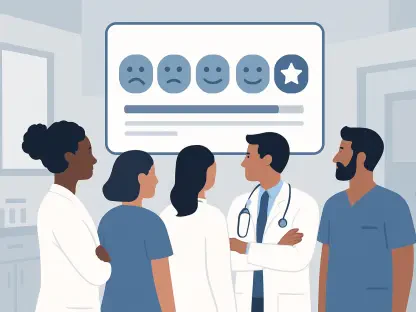The world is rapidly evolving with technological breakthroughs, leaving the healthcare industry at a pivotal crossroads. This year, healthcare data security is confronting unparalleled challenges requiring preemptive strategies and holistic solutions. Safeguarding sensitive medical information is crucial to maintain patient trust and the efficacy of healthcare services. Data protection forms the foundation upon which ethical and reliable healthcare practices are built. The increasing value of personal health records and financial data makes them alluring targets for cybercriminals. The potential consequences of failing to secure this data—ranging from financial loss to diminished public trust—highlight the urgent need for industry-wide vigilance and innovation.
Rising Cyber Threats in Healthcare
The growing trend of cyberattacks on healthcare systems is alarming, as the sector continues to be a prime target for malicious actors. Healthcare institutions store valuable personal and financial data, which makes them attractive to cybercriminals, who often employ ransomware to disrupt services and demand payment. Such attacks lead to significant financial losses and erode patient trust. As ransomware becomes an increasingly common tool in the cybercriminal’s arsenal, healthcare organizations must adapt rapidly to these threats, which have the potential to cause billions in damages globally. Given this environment, healthcare providers need to elevate their security postures significantly to protect their data ecosystems.
In the evolving digital-first healthcare world, accelerated technology adoption has brought new risks along with its benefits. The COVID-19 pandemic hastened the integration of digital tools like telemedicine and electronic health records. While these technologies improve service delivery and accessibility, they also increase the sector’s vulnerability to cyber threats. Each technological advancement introduces potential new entry points for cybercriminals. In response, sophisticated security measures must be designed and implemented at the inception of these technologies. Preventing and mitigating risks demands continuous vigilance and innovation in security protocols to remain ahead of increasingly sophisticated cyberthreats.
Regulatory Compliance and Its Impacts
The landscape of healthcare security regulation has tightened, compelling organizations to go beyond basic compliance measures with mandates such as HIPAA. Healthcare providers are now under greater scrutiny, tasked with employing advanced defense mechanisms to safeguard medical data and uphold patient confidence. An organization’s ability to comply with these regulations is crucial, as non-compliance leads to severe financial penalties and irreparable damage to reputation. The threat of steep fines serves as a potent deterrent, reinforcing the importance of adherence to these stringent guidelines. As regulations continue to evolve, healthcare facilities must remain agile and proactive in their security strategies.
Moreover, staying compliant is not merely about avoiding penalties. It is about embedding trust with patients and stakeholders. Heightened regulations offer an opportunity for healthcare organizations to showcase their commitment to data integrity and patient confidentiality. Successful compliance boosts an organization’s credibility, key to long-term survival in the competitive healthcare environment. When faced with mounting cyber threats, such adherence also strengthens organizational resilience. Thus, by adopting advanced compliance measures, healthcare entities protect their most valuable assets: patient data and institutional trust.
Innovative Security Solutions
Telliant Systems offers insights into innovative solutions tailored for the unique needs of healthcare providers. Effective strategies include utilizing the Advanced Encryption Standard (AES) along with integrating Single Sign-On (SSO), OAut##, and Multi-Factor Authentication (MFA). These approaches form the foundation of strong data protection frameworks, ensuring only authenticated personnel gain access to sensitive information. Such measures are vital in reducing the likelihood of data breaches, particularly in an environment where external threats are persistent. By implementing these cutting-edge technologies, healthcare organizations can fortify their defenses against unauthorized access and other malicious activities.
Furthermore, proactive risk management is recommended to protect healthcare data. This involves rigorous security assessments and adopting Software Development Lifecycle (SDLC) best practices. Conducting regular risk assessments and vulnerability scans can identify potential weaknesses, while systematic code reviews help mitigate risks before they become exploitable. Collaborating with experienced security professionals enhances a healthcare organization’s ability to safeguard its infrastructure effectively. Telliant Systems, for example, works with healthcare entities to seamlessly integrate these advanced security measures into their systems, thereby optimizing their defense mechanisms. These partnerships prove invaluable in not only managing ongoing risks but also in preparing for future challenges.
Challenges with Legacy Systems
A substantial challenge facing healthcare institutions lies in the prevalence of legacy systems, which often obstruct the adoption of modern security solutions. These outdated systems pose compatibility issues, making the integration of contemporary security features arduous and costly. Adapting or upgrading these systems is an expensive undertaking that not all organizations can afford. The financial burden of overhauling legacy infrastructure often competes with other operational needs for limited resources, crippling an organization’s ability to adopt cutting-edge security measures. Therefore, navigating these financial and technological challenges remains a top priority for many healthcare providers.
Budget constraints add another layer of difficulty to implementing advanced security solutions. Many healthcare institutions operate under tight financial conditions, forcing them to balance security investments with everyday operational demands. The struggle for limited funds often leads to prioritization, where immediate healthcare delivery needs overshadow long-term security measures. Compromises made today can lead to vulnerabilities being exploited tomorrow. Therefore, finding cost-effective solutions that provide adequate protection without straining budgets is crucial for healthcare organizations to strengthen their data security, ensuring continuity of care and patient safety.
Human Error and Security Awareness
Human error is a significant contributor to vulnerabilities within healthcare data security frameworks. Weak passwords, phishing scams, and device misplacements are frequent causes of breaches, accounting for a substantial portion of security incidents. To address this issue, it is imperative for healthcare organizations to foster a culture of security awareness among employees. By providing comprehensive training on recognizing security threats and adhering to strict protocols, organizations can considerably reduce risks associated with human errors. Educating healthcare workers on security fundamentals empowers them to act as a first line of defense in protecting sensitive information.
Encouraging a security-aware culture also necessitates the integration of continuous education and training programs. Educators should emphasize the identification of phishing attempts, recognizing social engineering tactics, and understanding the importance of maintaining strong, unique passwords. Incorporating these training protocols into ongoing professional development ensures that all personnel understand their role in safeguarding data, thereby enhancing the organization’s overall security posture. Furthermore, regular evaluation of these programs ensures effectiveness, allowing organizations to adapt to evolving threats and maintain a resilient workforce prepared to address emerging cybersecurity challenges.
Implications of Non-Compliance
Ignoring the imperative of data security in healthcare can lead to devastating financial and reputational outcomes. Data breaches, on average, can impose costs exceeding $10 million, a figure that underscores the dire implications of inadequate defense strategies. Additionally, breaches jeopardize the reputations of healthcare providers, requiring significant efforts to rebuild patient trust. Organizations that fail to prioritize data security face prolonged challenges in restoring confidence among patients and stakeholders, which can be more damaging than financial losses. As such, maintaining a robust security framework is critical for sustaining both the financial health and credibility of healthcare institutions.
Non-compliance with regulatory standards risks compounding these challenges, as organizations face stiff penalties and legal actions. Healthcare entities must not only adopt proactive security measures but also ensure compliance with existing regulations, like those enforced by HIPAA or the GDPR. These standards are in place to protect patient data and promote ethical practices within the industry. Failure to meet them can lead to punitive measures, highlighting the necessity for comprehensive risk management strategies. By securing compliance and maintaining high security standards, healthcare institutions mitigate risks and enhance their resilience against future challenges.
Best Practices for Data Protection
As technology advances at an unprecedented pace, the healthcare sector finds itself at a critical juncture. This year marks a significant challenge for healthcare data security, as it faces threats that demand proactive approaches and comprehensive strategies. Protecting sensitive medical records is essential to uphold the trust of patients and ensure efficient healthcare delivery. Robust data security serves as the foundation for ethical and trustworthy healthcare operations. The growing worth of personal health information, coupled with financial details, makes them tempting targets for cybercriminals. Failing to secure this data could lead to financial repercussions and a decline in public confidence, emphasizing the urgent necessity for heightened awareness and innovative measures across the industry. By prioritizing data protection, the healthcare sector can set a course for secure and dependable patient care, ensuring both technological progress and public trust are maintained in this ever-evolving landscape.









